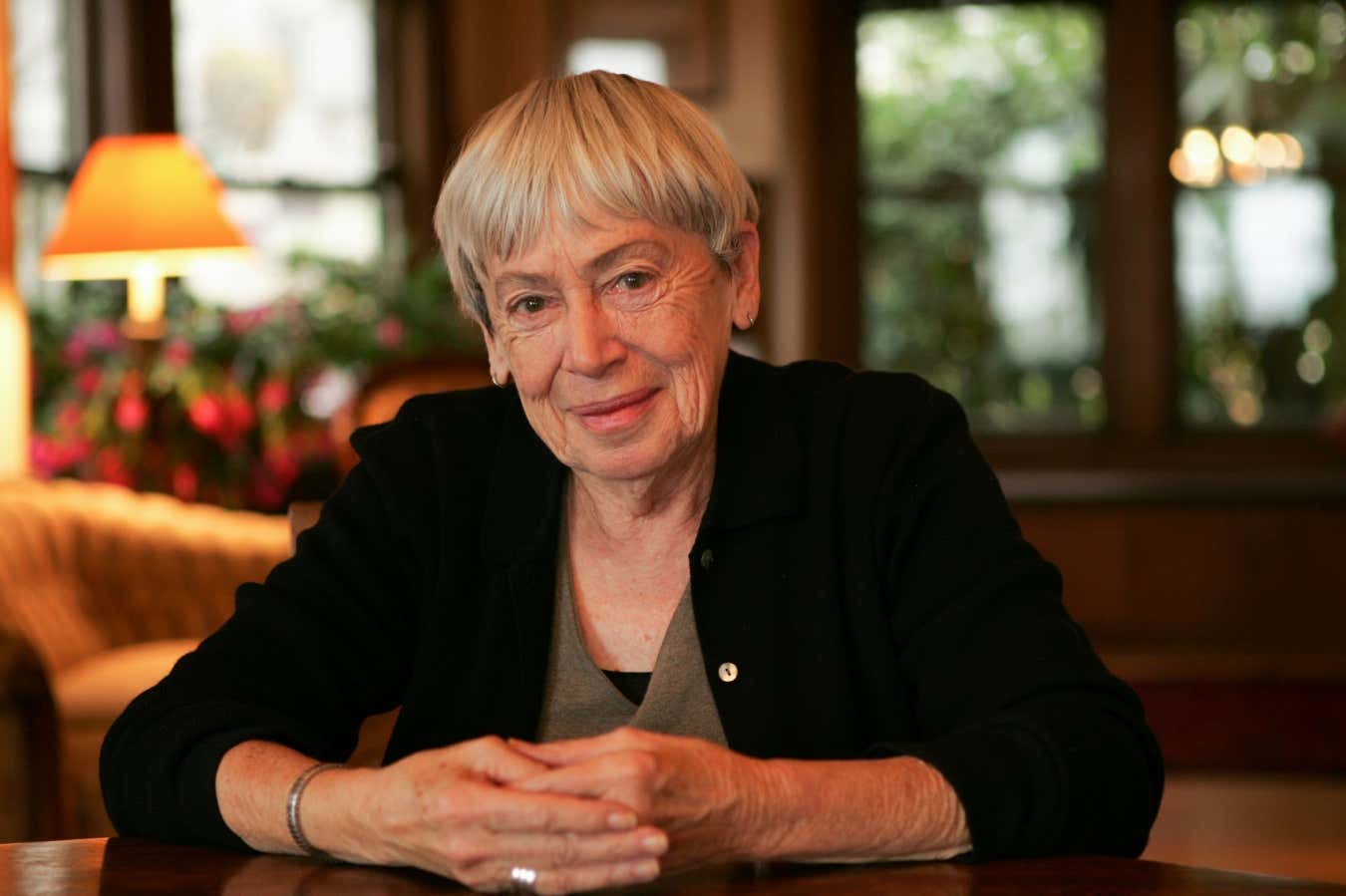
Ursula K. Le Guin in 2005
Dan Tuffs/Getty Images
When I’m asked by a Le Guin neophyte where to start, I rarely recommend The Dispossessed. I wouldn’t urge a stranger to leap into the deep end of a pool. Though the novel delicately explores matters of the heart, it is heady – in the sense of potency, but also in the sense that we are up in our heads while reading it. (Also up in the author’s head, which can be complicated when the author is your mother.) Other Le Guin novels are more situated in the heart, and when recommending a starting point, this seems safer. If, however, someone wants to know my favourite Le Guin book, The Dispossessed, published in 1974, is nearly always my answer.
A decade of writing that started in the early 1960s contains my mother’s best-known books, including half of the Earthsea books and The Left Hand of Darkness, culminating in The Dispossessed. A bibliographic list fails to capture the exhilaration and exhaustion of this period, as she produced a novel a year while managing a household, having a third kid (me), co-raising all of us (plus several cats) and moving to London for a year. Later in life, Ursula told me that people underestimate how draining a physical act it is to write a novel, even when the artist is well-supported. Not having written a novel myself, I can only look at this decade of her life and say: yes, I can imagine.
The common notion that Ursula favoured cultural world-building over genre tropes of the era is certainly true of The Dispossessed. Yes, we have a rocket ship, but also many more details relating to culture, from dress to sexual mores, on both Urras and Anarres. Ursula’s lifelong interest and passion for natural science appears in Shevek’s vocation and in the articulation of theories that lead to the ansible device. Her experience in academia provided vivid depictions of scholarly pettiness. Most of all, we find political philosophy and practicalities, a blueprint for radical collectivist reinvention, the ambiguous utopia of the book’s full title.
This blueprint has remained remarkably relevant 50 years on. For at least one generation, and thanks in part to university syllabi, The Left Hand of Darkness and The Dispossessed have become cornerstone texts on gender, anarchism and anti-capitalism. I’ve always thought of the books as cousins – two very different cousins that constantly challenge my preconceptions. By my lights, however, Left Hand, while exploring gender politics, isn’t a “political book”. I can imagine different political systems as a backdrop on Gethen. Indeed, Ursula remarked in a 1997 interview that “the politics in [The Left Hand of Darkness] are not too well thought-out.” On Anarres, conversely, political philosophy and systems are at the foreground. You couldn’t change them without changing every aspect of place, story, plot, character and relationships. This doesn’t make The Dispossessed a better book – Left Hand does its own and important things. But for sheer virtuosity in integrating the intellectual, ethical and poetic, the head and the heart, The Dispossessed is hard to beat.
For the generation of readers whose Le Guin reading may start and end with this pair of books, a resulting impression of the author as an early-and-forever radical thinker is reinforced by seeing the video of her 2014 National Book Foundation speech, which forcefully distills anti-capitalist themes from both novels. I don’t mind this impression of my mother, and she wouldn’t have minded it, either – better radical thinker than “Grande Dame of SFF”, or some such other gender- and genre-inflected nonsense. But the idea of Ursula as a forever-radical flattens the complexity of her life, a long and difficult journey to a reconciliation of early, Romantic ideals of capital-A Art with an understanding of art’s intersections with ethics, justice and politics. The decade I’m referencing, from Ursula’s early thirties to early forties, was deeply formative in this reconciliation.
I was a young child at this time, and Ursula never talked about her work then, so I can only speculate about the process of artistic maturation that led to The Dispossessed. With success and a supportive spouse, her life finally permitted deep research and reflection. Her roles as child, spouse and mother changed radically with the death of her father, as her marriage entered its second decade and her children grew up. The US’s prosecution of the Vietnam War, which Ursula abhorred and protested, crystallised her ideas about pacifism and systemic inequity. A lot had changed in the world, and in Ursula, between the romping windsteeds of Rocannon’s World (1966) and writing The Dispossessed, and she was ready to explore an alternative to the cycle of human injustice and cruelty.
The New Scientist Book Club is currently reading Ursula K. Le Guin’s The Dispossessed. Sign up and read along with us here.
Topics:
- Science fiction/
- New Scientist Book Club
Source link : https://www.newscientist.com/article/2494344-ursula-le-guins-son-on-why-the-dispossessed-is-maybe-his-favourite/?utm_campaign=RSS%7CNSNS&utm_source=NSNS&utm_medium=RSS&utm_content=home
Author :
Publish date : 2025-08-29 09:30:00
Copyright for syndicated content belongs to the linked Source.